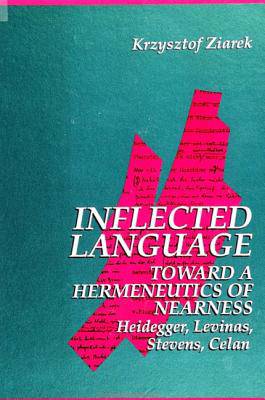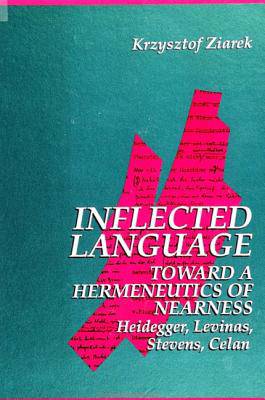
- Retrait gratuit dans votre magasin Club
- 7.000.000 titres dans notre catalogue
- Payer en toute sécurité
- Toujours un magasin près de chez vous
- Retrait gratuit dans votre magasin Club
- 7.000.0000 titres dans notre catalogue
- Payer en toute sécurité
- Toujours un magasin près de chez vous
Inflected Language: Toward a Hermeneutics of Nearness
Heidegger, Levinas, Stevens, Celan
Krzysztof ZiarekDescription
Proposes to rethink the ontological and ethical dimensions of language by rereading Heidegger's work and by engaging Levinas' ethics and contemporary poetics.
In the aftermath of poststructuralist debates, Inflected Language proposes to rethink the ontological and ethical dimensions of language by rereading Heidegger's work, more specifically his reflection on poetry, and by engaging Levinas' ethics and contemporary poetics. Building on the readings of Heidegger, Levinas, Stevens, and Celan, the author contends that, against common misinterpretations, their approach to language forces us to reexamine the very basis of relations to alterity, whether that of the world, things, or people.
According to the new view of language offered in these works, thought's job is not, first and foremost, cognition in the sense of understanding, calculations, and definition, but in securing alterity against cognitive assimilation instead. In this context, Inflected Language reshapes the current philosophico-literary debate about language by showing how the apparently neutral differential play of signification is already invested with ethical and worldly signification. In order to avoid obliterating this elusive signification in theorizing language, Ziarek proposes following a new mode of reading-a post-Heideggerian "hermeneutics of nearness," which foregrounds the poetic element in language and its ways of figuring the other.
Spécifications
Parties prenantes
- Auteur(s) :
- Editeur:
Contenu
- Nombre de pages :
- 239
- Langue:
- Anglais
- Collection :
Caractéristiques
- EAN:
- 9780791420591
- Date de parution :
- 25-10-94
- Format:
- Livre relié
- Format numérique:
- Genaaid
- Poids :
- 508 g

Les avis
Nous publions uniquement les avis qui respectent les conditions requises. Consultez nos conditions pour les avis.






